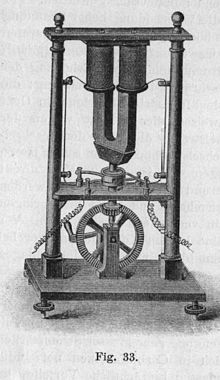Hippolyte Pixii: Difference between revisions
m Reverted edits by 209.129.211.22 (talk) (HG) (3.3.2) |
Removed header image as it's of John Ericsson |
||
| (28 intermediate revisions by 16 users not shown) | |||
| Line 1: | Line 1: | ||
{{Short description|French instrument maker (1808–1835)}} |
|||
| ⚫ | |||
{{more citations needed|date=January 2019}} |
|||
| ⚫ | '''Hippolyte Pixii''' (1808–1835) was an instrument maker from Paris, France. In 1832 he built an early form of [[alternating current]] electrical generator, based on the principle of |
||
| ⚫ | |||
| ⚫ | '''Hippolyte Pixii''' (1808–1835) was an instrument maker from Paris, France. In 1832 he built an early form of [[alternating current]] electrical generator, based on the principle of [[electromagnetic induction]] discovered by [[Michael Faraday]].<ref>Mohamed A. El-Sharkawi, ''Electric Energy: An Introduction, Third Edition'', CRC Press, 2015, {{ISBN|1498760031}}, page 3</ref> Pixii's device was a spinning magnet, operated by a hand crank, where the north and south [[Magnet|pole]]s passed over a coil with an iron core, and thus classified as a [[magneto]]. A current pulse was produced each time a pole passed over the coil. He also found that the current direction changed when the north pole passed over the coil after the south pole. Later, acting on a suggestion by [[André-Marie Ampère]], other results were obtained by introducing a [[Commutator (electric)|commutator]] which produced a pulsating [[direct current]]. At that time direct current was preferable to alternating current. Although Pixii did not fully understand electromagnetic induction, his device led to more sophisticated devices being constructed. |
||
A reproduction of Pixii's electrical generator can be admired at the [[Ampère Museum]], close to Lyon. |
|||
==See also== |
==See also== |
||
* [[Alternating current]] |
* [[Alternating current]] |
||
==References== |
|||
<references/> |
|||
{{Electric machines}} |
|||
{{DEFAULTSORT:Pixii, Hippolyte}} |
{{DEFAULTSORT:Pixii, Hippolyte}} |
||
[[Category:French |
[[Category:19th-century French engineers]] |
||
[[Category:People associated with electricity]] |
[[Category:People associated with electricity]] |
||
[[Category:1808 births]] |
[[Category:1808 births]] |
||
[[Category:1835 deaths]] |
[[Category:1835 deaths]] |
||
[[Category:Engineers from Paris]] |
|||
Latest revision as of 18:01, 21 May 2024
This article needs additional citations for verification. (January 2019) |

Hippolyte Pixii (1808–1835) was an instrument maker from Paris, France. In 1832 he built an early form of alternating current electrical generator, based on the principle of electromagnetic induction discovered by Michael Faraday.[1] Pixii's device was a spinning magnet, operated by a hand crank, where the north and south poles passed over a coil with an iron core, and thus classified as a magneto. A current pulse was produced each time a pole passed over the coil. He also found that the current direction changed when the north pole passed over the coil after the south pole. Later, acting on a suggestion by André-Marie Ampère, other results were obtained by introducing a commutator which produced a pulsating direct current. At that time direct current was preferable to alternating current. Although Pixii did not fully understand electromagnetic induction, his device led to more sophisticated devices being constructed. A reproduction of Pixii's electrical generator can be admired at the Ampère Museum, close to Lyon.
See also
[edit]References
[edit]- ^ Mohamed A. El-Sharkawi, Electric Energy: An Introduction, Third Edition, CRC Press, 2015, ISBN 1498760031, page 3
